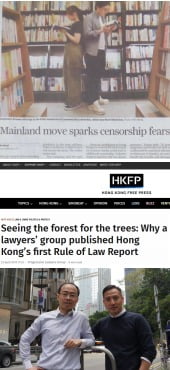Leninist frog-boil ratchet-click of the day comes courtesy of Hong Kong’s main (Chinese state-owned) book distributor, which, it says here, will now require inventory to be shipped via a warehouse in Nansha. The implication, in case you haven’t guessed, is that the cross-border round-trip will give Mainland censors a chance to filter out any counter-revolutionary or other undesirable material.
(I’m not a logistics expert, but I don’t think Watsons-your-personal-store trucks all our toothpaste and shampoo up to a depot in Guangzhou before delivering them to its Hong Kong branches.)
The constant barrage of Mainlandization is numbing. Among the heroes somehow keeping track of it are Kong Tsung-gan, cataloging trials of pro-democrats and political censorship, and the Progressive Lawyers Group with their new annual Rule of Law Report. (Among others: Reporters without Borders, and this interesting monitor of Li Po Chun United World College’s own little ‘Belt and Road’ infrastructure trap.)
One of the PLG lawyers mentions the numbing effect…
Our short attention span and even shorter memory have encouraged the government to bombard us with new headaches every few weeks. In this war of attrition, citizens barely have time to process yesterday’s news before a more complex and disconcerting issue hits them in the head and then all is forgotten.
Another reason for Hong Kong’s apparent passivity is simply that each tightening of Beijing’s grip is in itself relatively easy for most people to ignore. If there is any uproar about distribution of books via Nansha, it will be from greenies worried about the unnecessary carbon emissions.
The PLG lawyer goes on…
Our forgetfulness may also be by choice. It is a coping mechanism in response to the sense of powerlessness against a government that we played no part of electing and that remains brazenly unaccountable.
This is probably the clincher: there is no means of preventing this creeping Lenin-ization.
But there are ways of making it harder. Beijing has weak spots. Its local puppet regime comprises pitifully inept mediocrities. Its local support base includes unreliable, self-serving shoe-shiners – such as businessmen petrified of being extradited. Its paranoia-driven Hong Kong policy alienates overseas audiences (not least in Taiwan) and undermines its wider pretensions to be a cuddly win-win civilized player on the world stage. Surely, Hong Kong can hold out longer than Emperor-for-Life Xi and his (possible, alleged, nothing-trivial-I-hope) health problems?

